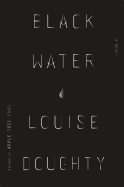
In Black Water, her follow-up to Apple Tree Yard, Louise Doughty has created a novel comparable to Graham Greene's masterpiece The Quiet American in its taut exploration of morality on a geopolitical and personal scale. Black Water follows John Harper, long-time employee of The Institute--a mysterious organization that amounts to a non-governmental spy agency--who is forced into an uneasy furlough in rural Indonesia after a lapse of operational judgment. Harper falls for Rita, another foreign transplant with a troubled past, as political turbulence increases prior to the 1998 resignation of President Suharto. Disturbing historical echoes force Harper to reckon with his own culpability in the 1965 massacres that killed some one million Indonesians, when he served as a courier ferrying lists of alleged communists to military officials.
The plot is complex and delves into dark, unjustly forgotten corners of history, including the brutal consequences of the United States' anticommunist efforts. That said, Black Water is as much a character study as it is an espionage thriller, determined to explicate Harper's fractured identity. He is the son of an Indonesian mother and a Dutch father killed by the Japanese during World War II, and extended flashbacks trace his piecemeal upbringing, including a heartbreaking stint in California with a surrogate African American family. Doughty establishes Harper's cynicism and destructive moral relativism as an understandable outgrowth of his past, while providing glimmers of a more optimistic future with Rita. Harper is "not so stupid to believe... that ugly things can't happen in beautiful places," but he's also not so far gone that he can't imagine something beautiful happening either. --Hank Stephenson, bookseller, Flyleaf Books

